Critically Discussing FDI's Positive Effects on India and UK Economies
VerifiedAdded on 2020/07/22
|7
|2099
|68
Report
AI Summary
This report provides a critical discussion on the positive impacts of Foreign Direct Investment (FDI) on the economies of India and the United Kingdom. It explores how FDI contributes to economic growth, technological advancements, employment, and global integration in both developed and developing countries. The analysis includes a review of the benefits of FDI, such as increased competition, transfer of technology, and the development of human resources, as well as the role of FDI in the context of globalization. The report highlights the significance of FDI for India's economic development and the UK's status as a major FDI recipient. The conclusion emphasizes the importance of FDI for the growth and development of host economies and its ambiguous but significant role in enhancing the economic conditions of both countries. The report is supported by relevant references from academic journals and online resources.

Critically Discuss Selected Topic
Paraphrase This Document
Need a fresh take? Get an instant paraphrase of this document with our AI Paraphraser

Table of Contents
INTRODUCTION...........................................................................................................................1
FDIs have a positive effect on the economy of India & United Kingdom.................................1
CONCLUSION................................................................................................................................4
REFERENCES................................................................................................................................5
INTRODUCTION...........................................................................................................................1
FDIs have a positive effect on the economy of India & United Kingdom.................................1
CONCLUSION................................................................................................................................4
REFERENCES................................................................................................................................5
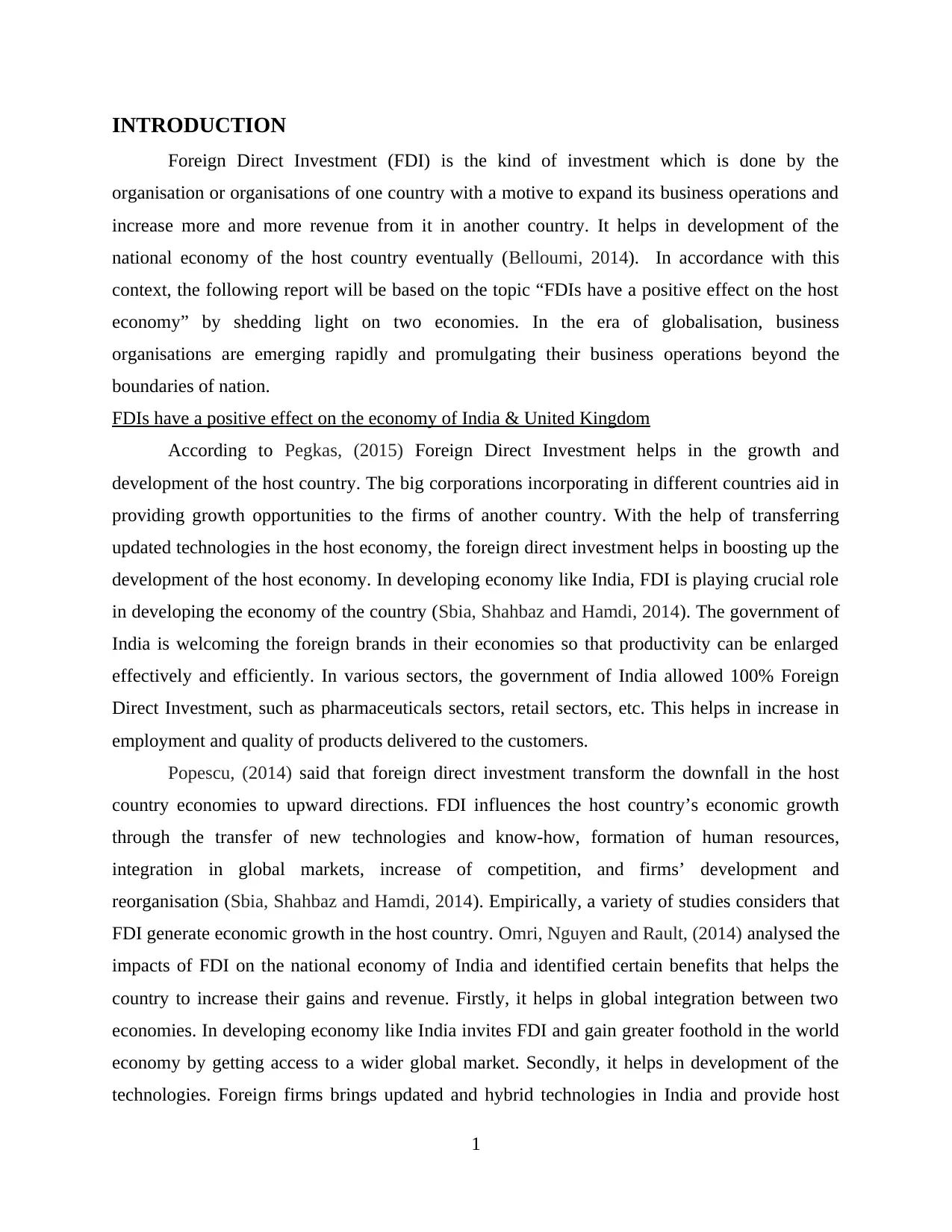
INTRODUCTION
Foreign Direct Investment (FDI) is the kind of investment which is done by the
organisation or organisations of one country with a motive to expand its business operations and
increase more and more revenue from it in another country. It helps in development of the
national economy of the host country eventually (Belloumi, 2014). In accordance with this
context, the following report will be based on the topic “FDIs have a positive effect on the host
economy” by shedding light on two economies. In the era of globalisation, business
organisations are emerging rapidly and promulgating their business operations beyond the
boundaries of nation.
FDIs have a positive effect on the economy of India & United Kingdom
According to Pegkas, (2015) Foreign Direct Investment helps in the growth and
development of the host country. The big corporations incorporating in different countries aid in
providing growth opportunities to the firms of another country. With the help of transferring
updated technologies in the host economy, the foreign direct investment helps in boosting up the
development of the host economy. In developing economy like India, FDI is playing crucial role
in developing the economy of the country (Sbia, Shahbaz and Hamdi, 2014). The government of
India is welcoming the foreign brands in their economies so that productivity can be enlarged
effectively and efficiently. In various sectors, the government of India allowed 100% Foreign
Direct Investment, such as pharmaceuticals sectors, retail sectors, etc. This helps in increase in
employment and quality of products delivered to the customers.
Popescu, (2014) said that foreign direct investment transform the downfall in the host
country economies to upward directions. FDI influences the host country’s economic growth
through the transfer of new technologies and know-how, formation of human resources,
integration in global markets, increase of competition, and firms’ development and
reorganisation (Sbia, Shahbaz and Hamdi, 2014). Empirically, a variety of studies considers that
FDI generate economic growth in the host country. Omri, Nguyen and Rault, (2014) analysed the
impacts of FDI on the national economy of India and identified certain benefits that helps the
country to increase their gains and revenue. Firstly, it helps in global integration between two
economies. In developing economy like India invites FDI and gain greater foothold in the world
economy by getting access to a wider global market. Secondly, it helps in development of the
technologies. Foreign firms brings updated and hybrid technologies in India and provide host
1
Foreign Direct Investment (FDI) is the kind of investment which is done by the
organisation or organisations of one country with a motive to expand its business operations and
increase more and more revenue from it in another country. It helps in development of the
national economy of the host country eventually (Belloumi, 2014). In accordance with this
context, the following report will be based on the topic “FDIs have a positive effect on the host
economy” by shedding light on two economies. In the era of globalisation, business
organisations are emerging rapidly and promulgating their business operations beyond the
boundaries of nation.
FDIs have a positive effect on the economy of India & United Kingdom
According to Pegkas, (2015) Foreign Direct Investment helps in the growth and
development of the host country. The big corporations incorporating in different countries aid in
providing growth opportunities to the firms of another country. With the help of transferring
updated technologies in the host economy, the foreign direct investment helps in boosting up the
development of the host economy. In developing economy like India, FDI is playing crucial role
in developing the economy of the country (Sbia, Shahbaz and Hamdi, 2014). The government of
India is welcoming the foreign brands in their economies so that productivity can be enlarged
effectively and efficiently. In various sectors, the government of India allowed 100% Foreign
Direct Investment, such as pharmaceuticals sectors, retail sectors, etc. This helps in increase in
employment and quality of products delivered to the customers.
Popescu, (2014) said that foreign direct investment transform the downfall in the host
country economies to upward directions. FDI influences the host country’s economic growth
through the transfer of new technologies and know-how, formation of human resources,
integration in global markets, increase of competition, and firms’ development and
reorganisation (Sbia, Shahbaz and Hamdi, 2014). Empirically, a variety of studies considers that
FDI generate economic growth in the host country. Omri, Nguyen and Rault, (2014) analysed the
impacts of FDI on the national economy of India and identified certain benefits that helps the
country to increase their gains and revenue. Firstly, it helps in global integration between two
economies. In developing economy like India invites FDI and gain greater foothold in the world
economy by getting access to a wider global market. Secondly, it helps in development of the
technologies. Foreign firms brings updated and hybrid technologies in India and provide host
1
⊘ This is a preview!⊘
Do you want full access?
Subscribe today to unlock all pages.

Trusted by 1+ million students worldwide
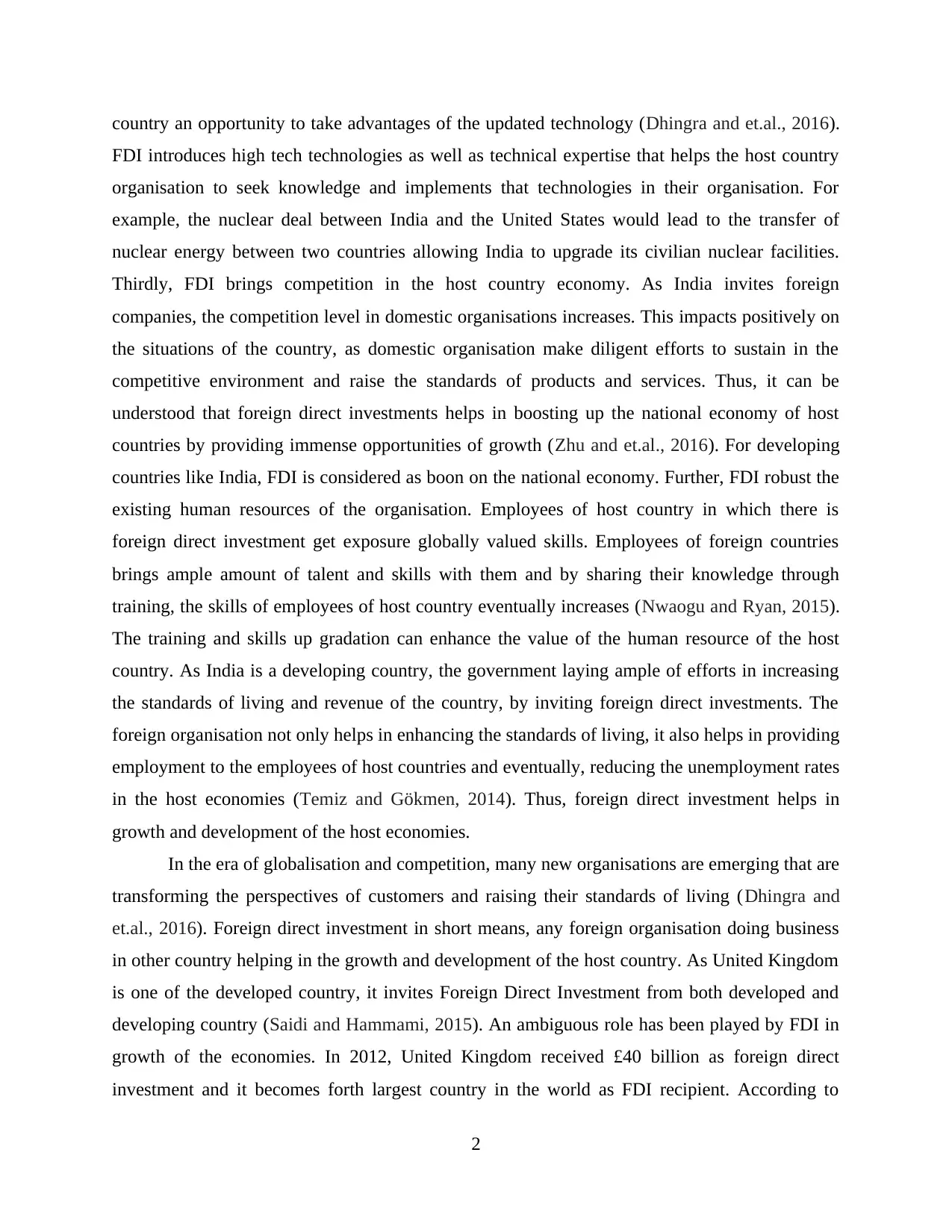
country an opportunity to take advantages of the updated technology (Dhingra and et.al., 2016).
FDI introduces high tech technologies as well as technical expertise that helps the host country
organisation to seek knowledge and implements that technologies in their organisation. For
example, the nuclear deal between India and the United States would lead to the transfer of
nuclear energy between two countries allowing India to upgrade its civilian nuclear facilities.
Thirdly, FDI brings competition in the host country economy. As India invites foreign
companies, the competition level in domestic organisations increases. This impacts positively on
the situations of the country, as domestic organisation make diligent efforts to sustain in the
competitive environment and raise the standards of products and services. Thus, it can be
understood that foreign direct investments helps in boosting up the national economy of host
countries by providing immense opportunities of growth (Zhu and et.al., 2016). For developing
countries like India, FDI is considered as boon on the national economy. Further, FDI robust the
existing human resources of the organisation. Employees of host country in which there is
foreign direct investment get exposure globally valued skills. Employees of foreign countries
brings ample amount of talent and skills with them and by sharing their knowledge through
training, the skills of employees of host country eventually increases (Nwaogu and Ryan, 2015).
The training and skills up gradation can enhance the value of the human resource of the host
country. As India is a developing country, the government laying ample of efforts in increasing
the standards of living and revenue of the country, by inviting foreign direct investments. The
foreign organisation not only helps in enhancing the standards of living, it also helps in providing
employment to the employees of host countries and eventually, reducing the unemployment rates
in the host economies (Temiz and Gökmen, 2014). Thus, foreign direct investment helps in
growth and development of the host economies.
In the era of globalisation and competition, many new organisations are emerging that are
transforming the perspectives of customers and raising their standards of living (Dhingra and
et.al., 2016). Foreign direct investment in short means, any foreign organisation doing business
in other country helping in the growth and development of the host country. As United Kingdom
is one of the developed country, it invites Foreign Direct Investment from both developed and
developing country (Saidi and Hammami, 2015). An ambiguous role has been played by FDI in
growth of the economies. In 2012, United Kingdom received £40 billion as foreign direct
investment and it becomes forth largest country in the world as FDI recipient. According to
2
FDI introduces high tech technologies as well as technical expertise that helps the host country
organisation to seek knowledge and implements that technologies in their organisation. For
example, the nuclear deal between India and the United States would lead to the transfer of
nuclear energy between two countries allowing India to upgrade its civilian nuclear facilities.
Thirdly, FDI brings competition in the host country economy. As India invites foreign
companies, the competition level in domestic organisations increases. This impacts positively on
the situations of the country, as domestic organisation make diligent efforts to sustain in the
competitive environment and raise the standards of products and services. Thus, it can be
understood that foreign direct investments helps in boosting up the national economy of host
countries by providing immense opportunities of growth (Zhu and et.al., 2016). For developing
countries like India, FDI is considered as boon on the national economy. Further, FDI robust the
existing human resources of the organisation. Employees of host country in which there is
foreign direct investment get exposure globally valued skills. Employees of foreign countries
brings ample amount of talent and skills with them and by sharing their knowledge through
training, the skills of employees of host country eventually increases (Nwaogu and Ryan, 2015).
The training and skills up gradation can enhance the value of the human resource of the host
country. As India is a developing country, the government laying ample of efforts in increasing
the standards of living and revenue of the country, by inviting foreign direct investments. The
foreign organisation not only helps in enhancing the standards of living, it also helps in providing
employment to the employees of host countries and eventually, reducing the unemployment rates
in the host economies (Temiz and Gökmen, 2014). Thus, foreign direct investment helps in
growth and development of the host economies.
In the era of globalisation and competition, many new organisations are emerging that are
transforming the perspectives of customers and raising their standards of living (Dhingra and
et.al., 2016). Foreign direct investment in short means, any foreign organisation doing business
in other country helping in the growth and development of the host country. As United Kingdom
is one of the developed country, it invites Foreign Direct Investment from both developed and
developing country (Saidi and Hammami, 2015). An ambiguous role has been played by FDI in
growth of the economies. In 2012, United Kingdom received £40 billion as foreign direct
investment and it becomes forth largest country in the world as FDI recipient. According to
2
Paraphrase This Document
Need a fresh take? Get an instant paraphrase of this document with our AI Paraphraser
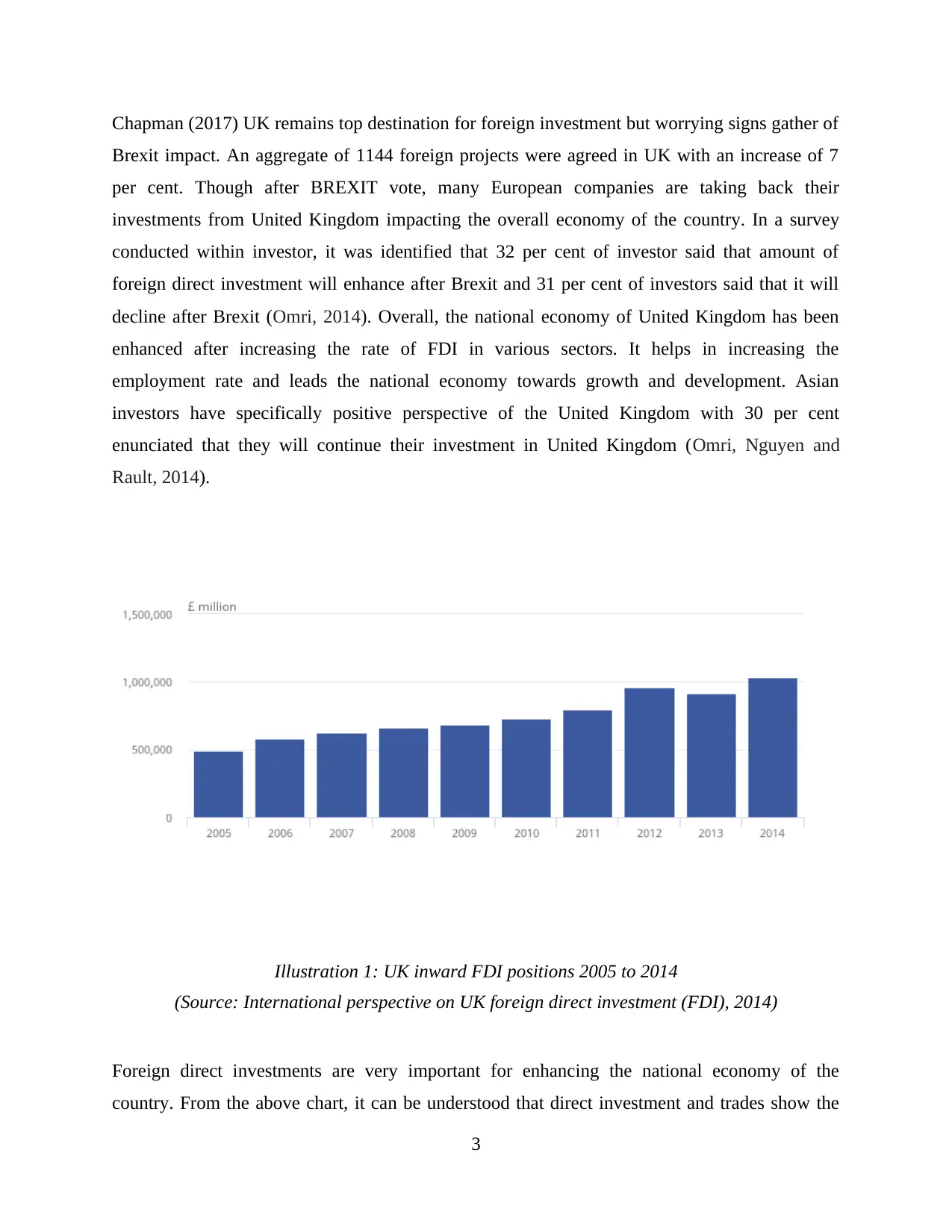
Chapman (2017) UK remains top destination for foreign investment but worrying signs gather of
Brexit impact. An aggregate of 1144 foreign projects were agreed in UK with an increase of 7
per cent. Though after BREXIT vote, many European companies are taking back their
investments from United Kingdom impacting the overall economy of the country. In a survey
conducted within investor, it was identified that 32 per cent of investor said that amount of
foreign direct investment will enhance after Brexit and 31 per cent of investors said that it will
decline after Brexit (Omri, 2014). Overall, the national economy of United Kingdom has been
enhanced after increasing the rate of FDI in various sectors. It helps in increasing the
employment rate and leads the national economy towards growth and development. Asian
investors have specifically positive perspective of the United Kingdom with 30 per cent
enunciated that they will continue their investment in United Kingdom (Omri, Nguyen and
Rault, 2014).
Foreign direct investments are very important for enhancing the national economy of the
country. From the above chart, it can be understood that direct investment and trades show the
3
Illustration 1: UK inward FDI positions 2005 to 2014
(Source: International perspective on UK foreign direct investment (FDI), 2014)
Brexit impact. An aggregate of 1144 foreign projects were agreed in UK with an increase of 7
per cent. Though after BREXIT vote, many European companies are taking back their
investments from United Kingdom impacting the overall economy of the country. In a survey
conducted within investor, it was identified that 32 per cent of investor said that amount of
foreign direct investment will enhance after Brexit and 31 per cent of investors said that it will
decline after Brexit (Omri, 2014). Overall, the national economy of United Kingdom has been
enhanced after increasing the rate of FDI in various sectors. It helps in increasing the
employment rate and leads the national economy towards growth and development. Asian
investors have specifically positive perspective of the United Kingdom with 30 per cent
enunciated that they will continue their investment in United Kingdom (Omri, Nguyen and
Rault, 2014).
Foreign direct investments are very important for enhancing the national economy of the
country. From the above chart, it can be understood that direct investment and trades show the
3
Illustration 1: UK inward FDI positions 2005 to 2014
(Source: International perspective on UK foreign direct investment (FDI), 2014)
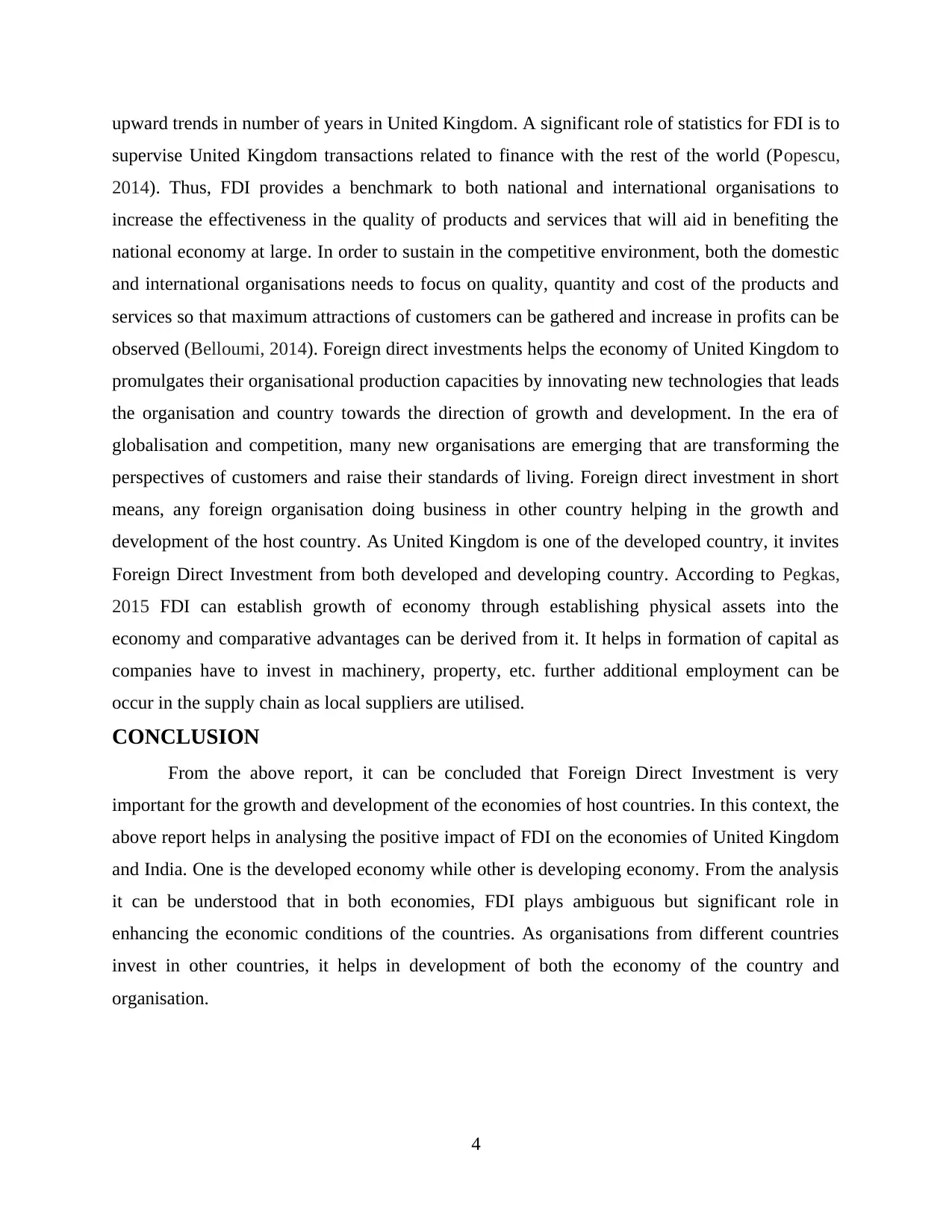
upward trends in number of years in United Kingdom. A significant role of statistics for FDI is to
supervise United Kingdom transactions related to finance with the rest of the world (Popescu,
2014). Thus, FDI provides a benchmark to both national and international organisations to
increase the effectiveness in the quality of products and services that will aid in benefiting the
national economy at large. In order to sustain in the competitive environment, both the domestic
and international organisations needs to focus on quality, quantity and cost of the products and
services so that maximum attractions of customers can be gathered and increase in profits can be
observed (Belloumi, 2014). Foreign direct investments helps the economy of United Kingdom to
promulgates their organisational production capacities by innovating new technologies that leads
the organisation and country towards the direction of growth and development. In the era of
globalisation and competition, many new organisations are emerging that are transforming the
perspectives of customers and raise their standards of living. Foreign direct investment in short
means, any foreign organisation doing business in other country helping in the growth and
development of the host country. As United Kingdom is one of the developed country, it invites
Foreign Direct Investment from both developed and developing country. According to Pegkas,
2015 FDI can establish growth of economy through establishing physical assets into the
economy and comparative advantages can be derived from it. It helps in formation of capital as
companies have to invest in machinery, property, etc. further additional employment can be
occur in the supply chain as local suppliers are utilised.
CONCLUSION
From the above report, it can be concluded that Foreign Direct Investment is very
important for the growth and development of the economies of host countries. In this context, the
above report helps in analysing the positive impact of FDI on the economies of United Kingdom
and India. One is the developed economy while other is developing economy. From the analysis
it can be understood that in both economies, FDI plays ambiguous but significant role in
enhancing the economic conditions of the countries. As organisations from different countries
invest in other countries, it helps in development of both the economy of the country and
organisation.
4
supervise United Kingdom transactions related to finance with the rest of the world (Popescu,
2014). Thus, FDI provides a benchmark to both national and international organisations to
increase the effectiveness in the quality of products and services that will aid in benefiting the
national economy at large. In order to sustain in the competitive environment, both the domestic
and international organisations needs to focus on quality, quantity and cost of the products and
services so that maximum attractions of customers can be gathered and increase in profits can be
observed (Belloumi, 2014). Foreign direct investments helps the economy of United Kingdom to
promulgates their organisational production capacities by innovating new technologies that leads
the organisation and country towards the direction of growth and development. In the era of
globalisation and competition, many new organisations are emerging that are transforming the
perspectives of customers and raise their standards of living. Foreign direct investment in short
means, any foreign organisation doing business in other country helping in the growth and
development of the host country. As United Kingdom is one of the developed country, it invites
Foreign Direct Investment from both developed and developing country. According to Pegkas,
2015 FDI can establish growth of economy through establishing physical assets into the
economy and comparative advantages can be derived from it. It helps in formation of capital as
companies have to invest in machinery, property, etc. further additional employment can be
occur in the supply chain as local suppliers are utilised.
CONCLUSION
From the above report, it can be concluded that Foreign Direct Investment is very
important for the growth and development of the economies of host countries. In this context, the
above report helps in analysing the positive impact of FDI on the economies of United Kingdom
and India. One is the developed economy while other is developing economy. From the analysis
it can be understood that in both economies, FDI plays ambiguous but significant role in
enhancing the economic conditions of the countries. As organisations from different countries
invest in other countries, it helps in development of both the economy of the country and
organisation.
4
⊘ This is a preview!⊘
Do you want full access?
Subscribe today to unlock all pages.

Trusted by 1+ million students worldwide
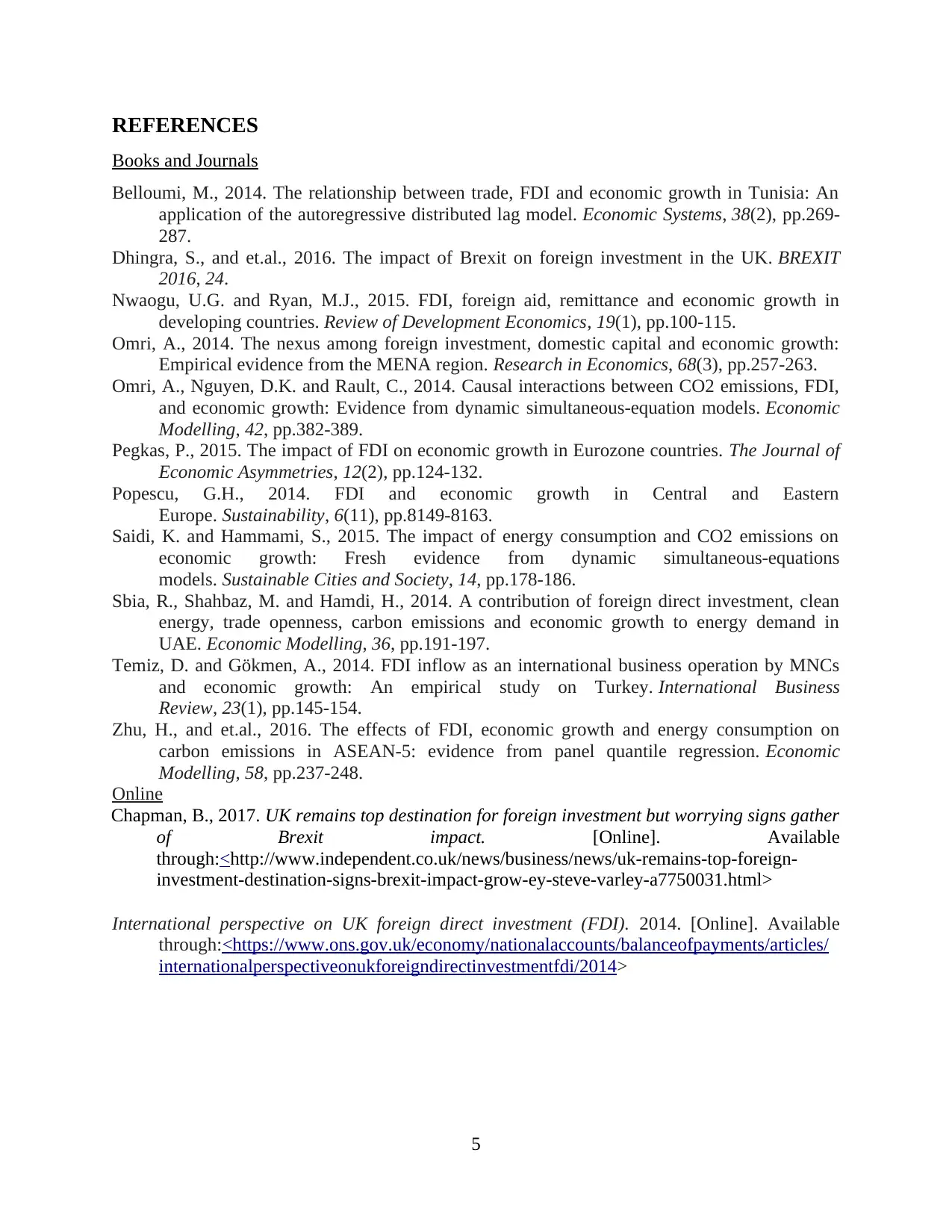
REFERENCES
Books and Journals
Belloumi, M., 2014. The relationship between trade, FDI and economic growth in Tunisia: An
application of the autoregressive distributed lag model. Economic Systems, 38(2), pp.269-
287.
Dhingra, S., and et.al., 2016. The impact of Brexit on foreign investment in the UK. BREXIT
2016, 24.
Nwaogu, U.G. and Ryan, M.J., 2015. FDI, foreign aid, remittance and economic growth in
developing countries. Review of Development Economics, 19(1), pp.100-115.
Omri, A., 2014. The nexus among foreign investment, domestic capital and economic growth:
Empirical evidence from the MENA region. Research in Economics, 68(3), pp.257-263.
Omri, A., Nguyen, D.K. and Rault, C., 2014. Causal interactions between CO2 emissions, FDI,
and economic growth: Evidence from dynamic simultaneous-equation models. Economic
Modelling, 42, pp.382-389.
Pegkas, P., 2015. The impact of FDI on economic growth in Eurozone countries. The Journal of
Economic Asymmetries, 12(2), pp.124-132.
Popescu, G.H., 2014. FDI and economic growth in Central and Eastern
Europe. Sustainability, 6(11), pp.8149-8163.
Saidi, K. and Hammami, S., 2015. The impact of energy consumption and CO2 emissions on
economic growth: Fresh evidence from dynamic simultaneous-equations
models. Sustainable Cities and Society, 14, pp.178-186.
Sbia, R., Shahbaz, M. and Hamdi, H., 2014. A contribution of foreign direct investment, clean
energy, trade openness, carbon emissions and economic growth to energy demand in
UAE. Economic Modelling, 36, pp.191-197.
Temiz, D. and Gökmen, A., 2014. FDI inflow as an international business operation by MNCs
and economic growth: An empirical study on Turkey. International Business
Review, 23(1), pp.145-154.
Zhu, H., and et.al., 2016. The effects of FDI, economic growth and energy consumption on
carbon emissions in ASEAN-5: evidence from panel quantile regression. Economic
Modelling, 58, pp.237-248.
Online
Chapman, B., 2017. UK remains top destination for foreign investment but worrying signs gather
of Brexit impact. [Online]. Available
through:<http://www.independent.co.uk/news/business/news/uk-remains-top-foreign-
investment-destination-signs-brexit-impact-grow-ey-steve-varley-a7750031.html>
International perspective on UK foreign direct investment (FDI). 2014. [Online]. Available
through:<https://www.ons.gov.uk/economy/nationalaccounts/balanceofpayments/articles/
internationalperspectiveonukforeigndirectinvestmentfdi/2014>
5
Books and Journals
Belloumi, M., 2014. The relationship between trade, FDI and economic growth in Tunisia: An
application of the autoregressive distributed lag model. Economic Systems, 38(2), pp.269-
287.
Dhingra, S., and et.al., 2016. The impact of Brexit on foreign investment in the UK. BREXIT
2016, 24.
Nwaogu, U.G. and Ryan, M.J., 2015. FDI, foreign aid, remittance and economic growth in
developing countries. Review of Development Economics, 19(1), pp.100-115.
Omri, A., 2014. The nexus among foreign investment, domestic capital and economic growth:
Empirical evidence from the MENA region. Research in Economics, 68(3), pp.257-263.
Omri, A., Nguyen, D.K. and Rault, C., 2014. Causal interactions between CO2 emissions, FDI,
and economic growth: Evidence from dynamic simultaneous-equation models. Economic
Modelling, 42, pp.382-389.
Pegkas, P., 2015. The impact of FDI on economic growth in Eurozone countries. The Journal of
Economic Asymmetries, 12(2), pp.124-132.
Popescu, G.H., 2014. FDI and economic growth in Central and Eastern
Europe. Sustainability, 6(11), pp.8149-8163.
Saidi, K. and Hammami, S., 2015. The impact of energy consumption and CO2 emissions on
economic growth: Fresh evidence from dynamic simultaneous-equations
models. Sustainable Cities and Society, 14, pp.178-186.
Sbia, R., Shahbaz, M. and Hamdi, H., 2014. A contribution of foreign direct investment, clean
energy, trade openness, carbon emissions and economic growth to energy demand in
UAE. Economic Modelling, 36, pp.191-197.
Temiz, D. and Gökmen, A., 2014. FDI inflow as an international business operation by MNCs
and economic growth: An empirical study on Turkey. International Business
Review, 23(1), pp.145-154.
Zhu, H., and et.al., 2016. The effects of FDI, economic growth and energy consumption on
carbon emissions in ASEAN-5: evidence from panel quantile regression. Economic
Modelling, 58, pp.237-248.
Online
Chapman, B., 2017. UK remains top destination for foreign investment but worrying signs gather
of Brexit impact. [Online]. Available
through:<http://www.independent.co.uk/news/business/news/uk-remains-top-foreign-
investment-destination-signs-brexit-impact-grow-ey-steve-varley-a7750031.html>
International perspective on UK foreign direct investment (FDI). 2014. [Online]. Available
through:<https://www.ons.gov.uk/economy/nationalaccounts/balanceofpayments/articles/
internationalperspectiveonukforeigndirectinvestmentfdi/2014>
5
1 out of 7
Related Documents
Your All-in-One AI-Powered Toolkit for Academic Success.
+13062052269
info@desklib.com
Available 24*7 on WhatsApp / Email
![[object Object]](/_next/static/media/star-bottom.7253800d.svg)
Unlock your academic potential
Copyright © 2020–2026 A2Z Services. All Rights Reserved. Developed and managed by ZUCOL.





